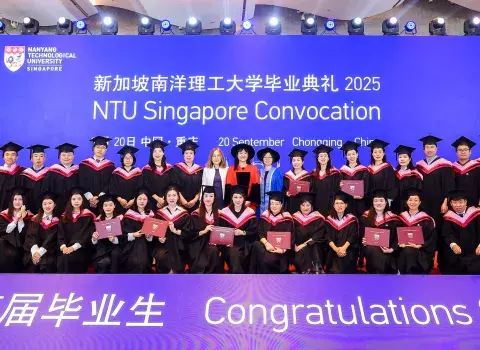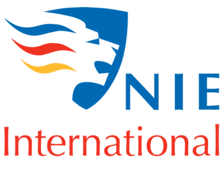
Master in Educational Administration
The Master in Educational Administration, conducted in Mandarin Chinese, develops professionalism in educational management for senior professionals in China through NIE's interdisciplinary, interactive programme that includes economics and management modules.
Overview
The Master in Educational Administration is a premier academic programme primarily conducted in Mandarin Chinese language to develop professionalism in effective management of schools and education institutes in an environment which is increasingly market-driven.
Drawing on NIE's unique expertise in both research and professional practice, this international award programme is designed and contextualised for an international body of senior professionals in China. The programme is relevant to a wide range of participants, including:
- Academic staff in universities and colleges
- Senior teachers in schools
- Senior managers and administrators in schools, colleges, universities and educational and government organisations
- Educators in the private sector
The strength of this programme is its interdisciplinary nature. Economics and management modules are being included, enabling participants to evaluate the value of education in both economic and social development context. This innovative programme offers an opportunity for a cross-cultural and global perspective on professionalism in education.
The teaching faculty, consisting of both local and expatriate scholars at the leading edge of their respective fields, provide a stimulating exchange of ideas amongst the participants and teaching faculty. NIE's delivery is highly interactive and participative. Participants are considered as partners and fellow collaborators in the learning process, being engaged through diverse pedagogies, such as projects, dialogue, simulations, case studies and scenarios. These pedagogical designs are meant to stimulate and build the cognitive, affective, reflective and analytical capacities among participants.
Programme structure
The Master in Educational Administration programme is a 30 AU programme requiring students to take six elective courses (24 AU), and two core courses including one methodology model (4 AU) and a 2 AU Integrative Project.
Core Course
This course introduces participants to the fundamental processes involved in conducting educational research such as formulating research questions, writing a review of the literature by synthesizing empirical studies, understanding various methodological approaches, collecting and interpreting research data.
Participants in this course will have opportunities to develop the skills, knowledge and strategies needed to read, interpret, and evaluate research reports. In addition, participants will gain a critical understanding of quantitative and qualitative approaches, and mixed research designs and action research. All these courses will be very helpful for participants to take other courses and for their further learning.
This is an independent capstone study of 2 Academic Units (2 AU) in which each student will select a topic in the areas of educational administration, curriculum, and leadership, which forms the focus of inquiry. It is the required final project for all MEA students. The students will conduct a solid review of the relevant literature to inform their research questions and guide their design of the inquiry. Then they will write and present a research proposal, as well as writing a reflection on how this proposal helps them to consolidate their learning in the MEA program and offers insights into their professional practices. By engaging in this inquiry-based study, students are expected to demonstrate a thorough understanding of their chosen area of focus. They should provide sound justifications for their research questions, highlighting the significance and relevance of their chosen topics. Furthermore, students must propose appropriate and rigorous educational research paradigms and methods to collect and analyze data, ensuring the validity and reliability of their findings.
The course offers a platform for students to bridge the gap between theory and practice. It encourages them to apply their acquired knowledge and skills to conduct meaningful investigations into important issues within the field of educational administration, thereby contributing to the advancement of the discipline and enhancing their professional growth in practice.
Elective Course (choose 6)
The main instructional aims and learning objectives are as follows:
- Introduction: The World and Schooling in the 21st Century
- Mission and Responsibilities of School Leaders
- School Development Strategy and Direction
- The Importance of School Culture
- Holistic Education and Curriculum Programme
- Pedagogy and Assessment
- Moral Education
- Staff Management and Development
- Excellent School Management and Evaluation
The main instructional aims and learning objectives are as follows:
- To understand that educational leaders need to gain knowledge of both classic and contemporary perspectives of educational philosophies;
- To become familiar with the characteristics of good leaders;
- To learn the theories of leading and managing styles;
- To learn models of decision-making;
- To learn cultural aspects of educational institutions, and the tactics of building effective leading teams;
- To learn balanced leadership, harmonious and eco-leadership;
- To explore the origins of servant leadership, and its philosophical fundamentals; and
- To understand the strategic leadership, and its importance in organizational development.
The main instructional aims and learning objectives are as follows:
- To be aware of key characteristics of the changing environment;
- To be familiar with features of innovative organizations;
- To understand management of educational philosophies;
- To broaden students’ understanding of teachers’ humanistic qualities;
- To enhance awareness of the changing patterns of teachers’ influence on students;
- To learn relevant Chinese classic perspectives of change;
- To learn skills of overcoming resistance to change; and
- To cognize the significance of leaders’ continual learning and research to enhance their abilities to ride on change.
This course introduces you to the basic concepts and analytical tools of microeconomics and demonstrates how these concepts are used in analyzing educational policy problems and designing appropriate responses to achieve desirable outcomes in the fields of education and manpower requirements. The course covers relevant microeconomics topics, such as theory of invisible hand and market mechanism, market imperfections and market failure, economics of public policy, cost-benefit analysis and its application.
The main instructional aims and learning objectives are as follows:
- Lays a theoretical and practical foundation for the participants
- Understand the 21 century competencies, skills, and desired educational outcomes
- Understand the theoretical foundation of current educational innovation in instruction and assessment
- Understand different instruction and assessment methods in educational innovation
- Design new instruction and assessment methods
Technology becomes increasingly important in the current digital and uncertain society. It is therefore imperative for teachers and school leaders to effectively use technology to support and manage teaching and learning. This course aims to equip participants with a solid understanding of the key roles of technology in education, benefits and challenges of technology, and various ways of effectively using technology to support teaching and learning. This course includes both theories and practice. Participants will learn some relevant learning theories and how people learn with the support of technology. They will also learn how to use technology as cognitive tools, how to design effective technology-enhanced learning environments, and how to increase teachers’ pedagogical and technological proficiencies. In addition, they also have hands-on experience on various ICT tools, and analyse the educational affordances of the tools.
Understand the theories and practices of educational quality, educational quality guarantee system and educational quality evaluation; identify the ways of external quality assurance; summarize and estimate approaches of internal quality assurance; clarify the relationships between education quality and educational aims and teaching objectives, curriculum provision, teaching process, teaching evaluation and the teachers’ development; improve skills to find, analyze and solve problems about education quality; through action research, improve the skills of reflection in action and reflection on action.
The purpose of this course is to help colleagues who are interested in education to systematically understand the theoretical framework and knowledge system of students’ appraisal, so that students can clarify students’ appraisal and its related concepts, understand the historical development of students’ appraisal and current international development trends, and master the basic principles, fundamental methods and the common tools about students’ appraisal. In addition, they can use the acquired knowledge to analyze the practical problems existing in the current students’ appraisal and discuss the corresponding system reform, so as to improve the students' ability to research and carry out student evaluation, and promote their professional development in the education field.
The main instructional aims and learning objectives are as follows:
- To be aware of the basic theories and key characteristics of teacher’s evaluation.
- To understand the basic theory of teacher’s professional development.
- To understand the rules of teachers’ professional development.
- To enhance the teachers’ evaluation competence.
- To promote the teacher’s own professional development.
The main instructional aims and learning objectives are as follows:
- To be familiar with the relationship between Character and Citizenship Education (CCE), values, character, and life skills.
- To examine current issues and empirical evidence related to values and life skills development through physical education and sport (PES) programmes.
- To learn the principles and frameworks used for values and life skills development.
- To learn strategies on intentional planning and facilitating values and life skills development through PES.
- To learn strategies on whole-school approaches in developing values and life skills and transfer these learnings beyond the context of school.
- To learn tools to evaluate the effectiveness of the teaching and learning of values and life skills.
This course aims to provide school leaders, middle management leaders and teacher leaders an overview of leadership and expertise in promoting curriculum innovation and pedagogical change that impact teacher learning. The course will provide opportunities to explore teachers’ deep-rooted epistemological beliefs in curricular design, pedagogical practice and professional learning.
The course will also discuss management tools in assessing the quality of curricular and pedagogical practice. To deepen the understandings of change leadership in curriculum and practice, the course will guide you to raise critical issues, and examine the potentials of ideas and gaps in theory and practice. You will not only be able to lead curriculum innovation and pedagogical change confidently, but also provide pertinent advice to policymakers, curriculum developers, and practitioners.
Apply Now
Timeframe
This is a one-year full time programme.
The MEA programme structure, has two modalities as follows:
- The students complete 8AU in China for the first trimester, and complete the remaining 22AU in Singapore.
- The students to complete all 30AU in Singapore.
Entry requirement
It is a full-time programme by coursework. The admission requirement as follows:
- A recognized Bachelor’s Degree granted by a Higher Learning Institute;
- Minimum three years of full-time administration or teaching; and
- Currently in a management position or will be appointed to a management position.
The National Institute of Education, Singapore reserves the rights to determine other pertinent requirements as necessary.
Steps to apply
Application for the MEA programme is only through Education Department/Bureau of the respective China Provinces/Municipality and appointed Education Institutions /Organisations* to NIE International.
Please note that applications through unauthorised channels are prohibited.
*For any queries, please direct to Mr Liu Xing at mea@nie.edu.sg.
